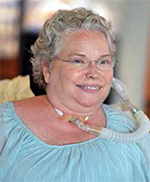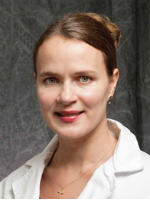 With a $300,000, three-year grant from the National Institutes of Health’s National Library of Medicine (NLM), Margaret A. Nosek, PhD, is developing a website that will house comprehensive information for women with mobility disabilities across the entire spectrum of participation limitations.
With a $300,000, three-year grant from the National Institutes of Health’s National Library of Medicine (NLM), Margaret A. Nosek, PhD, is developing a website that will house comprehensive information for women with mobility disabilities across the entire spectrum of participation limitations.
“We know that fragmented information is available on the Internet about the health issues women with disabilities face, but it’s neither organized nor easily accessible,” says Dr. Nosek, executive director of the Center for Research on Women with Disabilities (CROWD) and professor of physical medicine and rehabilitation at Baylor College of Medicine. “Our job with this grant is to find the information that’s out there and bring it to women in an easily retrievable manner in a way that relates to their lives.”
Disability is defined as an inability to manage the natural functions of the body, which includes sexuality as well as bladder and bowel management. “We want to open the door on all the unspoken issues,” Dr. Nosek says. “Among the things we’ve encountered, for instance, is a lack of information on pelvic prolapse. Pregnancy affects the entire pelvic floor, and any woman who has had a baby is at risk for uterine prolapse. We’ve also heard from many women with spinal cord injury that they experience more spasms during their monthly periods, but we’ve found no scientific research on the effect of menstruation on spasticity. We need more research in this area. Physicians outside the rehabilitation community have a tendency to treat men and women with movement disabilities in the same way, which is something else we want to change. Women need to have the courage to bring these health issues up with their doctors, and doctors have a responsibility to ask their patients about them.”
Women with disabilities have co-morbidities, and many have cognitive issues. “We know that people with cognitive issues are more sensitive to colors, the busyness of websites and the light emitted from a computer,” Dr. Nosek says. “We want to ensure that the website we create is universally acceptable. It will have white space, soft colors and clear contrast. In terms of content, our goal is to gather as much information as we can find on the National Library of Medicine’s Medline Plus and on websites created by other academic centers, and present this information in a consumer-friendly format.”
Brenda Eames, TIRR Memorial Hermann’s librarian, was key to winning the NLM award and will play a crucial role in helping to develop the website and in spreading the word to the disability community. As part of the grant proposal, she conducted a systematic review of the literature to find resources for consumers. For the next three years, she will spend a fifth of her work time gathering information for the website.
“We’ll be creating a specialized resource similar to Medline Plus that will house information for women with disabilities, including the special issues they face related to reproductive health, pelvic health and sexual health,” Eames says. “Much of this information is not currently available on Medline Plus. For information relevant to women with disabilities that is available, we’ll provide a direct link to it from our site. There’s so much to sift through, including guidelines for care, information on the existing CROWD website, Medline Plus, disability-related organizations and resources compiled at academic medical centers. We want to find as much as possible to avoid reinventing the wheel. This website is a much-needed resource for women with disabilities.”
As part of the grant, Dr. Nosek and her team will survey 500 women with disabilities to learn where they get their health information. “We want to know if they use a laptop to research information, whether they hear it word-of-mouth from other women or if they talk with their physicians,” she says. “Once we’ve learned what women want through our initial interviews, we’ll design our resource to meet those needs.”
Brenda Eames will use her connections with library groups in the community and throughout the state to raise awareness of the website. “Over the long term we want women who use the website to have access to information from all medical specialties about women’s health across the life span,” she says.
 On the hands-on clinical side, Dr. Nosek is working with Lisa Wenzel, MD, to launch a clinic for women with disabilities as part of TIRR Memorial Hermann’s existing Outpatient Medical Clinic. Dr. Wenzel is an attending physician in the Spinal Cord Injury and Specialty Rehabilitation Programs at TIRR and an assistant professor of physical medicine and rehabilitation at Baylor College of Medicine. Integrally involved with the clinic is obstetrician/gynecologist Hunter Hammill, MD, an attending physician at TIRR Memorial Hermann Outpatient Medical Clinic, who has helped spinal cord injury patients deliver babies for more than 30 years.
On the hands-on clinical side, Dr. Nosek is working with Lisa Wenzel, MD, to launch a clinic for women with disabilities as part of TIRR Memorial Hermann’s existing Outpatient Medical Clinic. Dr. Wenzel is an attending physician in the Spinal Cord Injury and Specialty Rehabilitation Programs at TIRR and an assistant professor of physical medicine and rehabilitation at Baylor College of Medicine. Integrally involved with the clinic is obstetrician/gynecologist Hunter Hammill, MD, an attending physician at TIRR Memorial Hermann Outpatient Medical Clinic, who has helped spinal cord injury patients deliver babies for more than 30 years.
“There is an enormous need for women with disabilities to be seen by primary care physicians who are sensitive to their needs beyond the obvious fertility issues,” Dr. Wenzel says. “We want to ensure that the psychosocial needs of women with disabilities, which are often neglected, are met along with their physical needs.”
Watch for news of the outpatient medical clinic in the next issue of the TIRR Memorial Hermann Journal.